Cannabis in Massachusetts
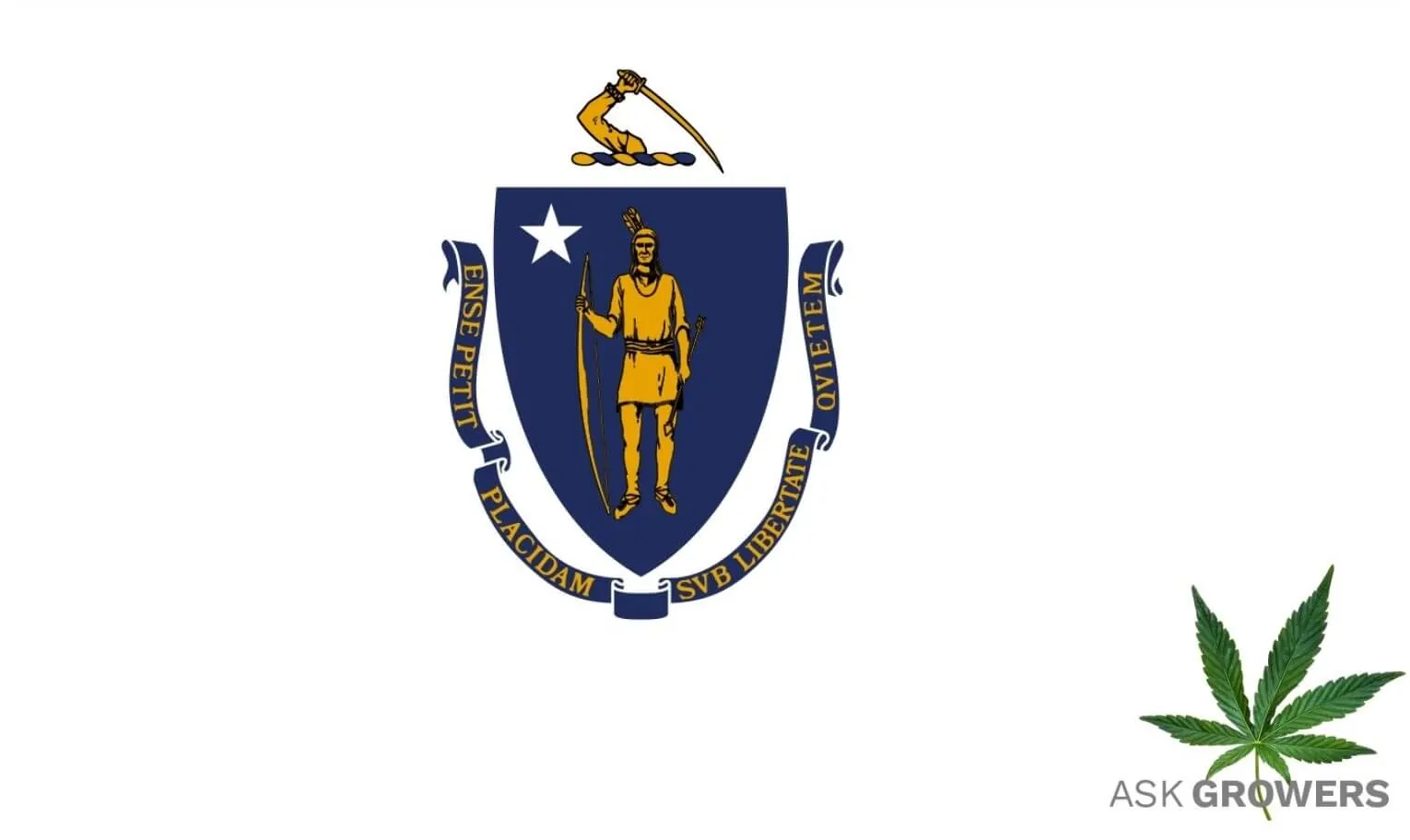
- Is Weed Legal in Massachusetts?
- Buying Marijuana in Massachusetts?
- Cannabis Consumption in Massachusetts
- Taxes on Marijuana in Massachusetts
- Massachusetts Medical Marijuana Card
- Transporting Marijuana in Massachusetts
- Exporting Marijuana
- Growing Marijuana
- Licensing for Growers, Manufacturers, Processors, Retailers, Etc.
- Sources
The marijuana market in Massachusetts keeps on growing, so understanding the nature of the state cannabis laws that are constantly evolving is very important. Discover all your limitations and rights if you are going to the state and planning to explore its hemp culture. This knowledge will keep you safe on the East Coast.
Is Weed Legal in Massachusetts?
The cannabis decriminalization story, which occurred in several stages, began in 2008 when voters approved an initiative in regard to cannabis possession. The possession of less than 1 oz. of weed was punishable with a $100 fine without the report being sent to the criminal history board.
Medical weed legalization took place in Massachusetts in 2012, and the pot laws became effective in 2013. It was the 18th U.S. state that made medical weed legal. On seeing the success of the cannabis program, the state government continued moving forward and put the legalization of recreational pot on the ballot in 2016. Again, it was approved. In 2018, the first licensed hemp retail stores opened their doors across the state.
Nowadays, the cannabis market is of paramount importance for the state. Despite COVID closures, weed gross sales surpassed $1B only 2 years after pot legalization.
Buying Marijuana in Massachusetts?
According to Massachusetts recreational weed law, adult individuals of 21 and older can possess 1 oz./28 g of cannabis (or 5 g of concentrate) in public and up to 10 oz. inside their homes. Within a private residence, any products over 1 oz. should be kept in a locked area (a safe or room) away from children and pets.
The purchase limit is the same. Customers can buy a combination of products but not more than 1 oz. in total. Even hemp-infused edibles available in stores come with 100 mg of THC per package. The possession of more than 1 oz. is considered a misdemeanor and subject to a $500 fine (as a first offense).
Read Also: Guide To Buying Cannabis
Medical marijuana (MMJ) patients and their caregivers can carry the same amount of weed in the state – 1 oz. Under the MMJ use statute, qualified patients of 18 and older are limited to buy a 2-month supply of 10 oz. from a dispensary, but they can purchase more if there is a physician’s prescription.
Though cannabis is legalized in the state, local municipalities are free to ban hemp sales and can regulate the operation hours of dispensaries. In some cities, dispensaries are open till 10 p.m., while others are forced to close by 5 p.m. The typical store hours of Boston dispensaries are 8 a.m.-6 p.m. (Monday-Friday) and 10 a.m.-4 p.m. (Saturday-Sunday). Find of cannabis shops near you home.
Marijuana delivery is allowed for MMJ patients, so they can have hemp brought to their doorstep. The delivery services of recreational weed have the potential to open their businesses soon.
The variety of goods in stores is wide – edibles, tinctures, oils, flowers, pre-rolled joints, concentrates, and more. The products differ from store to store, so check the menu online before you go.
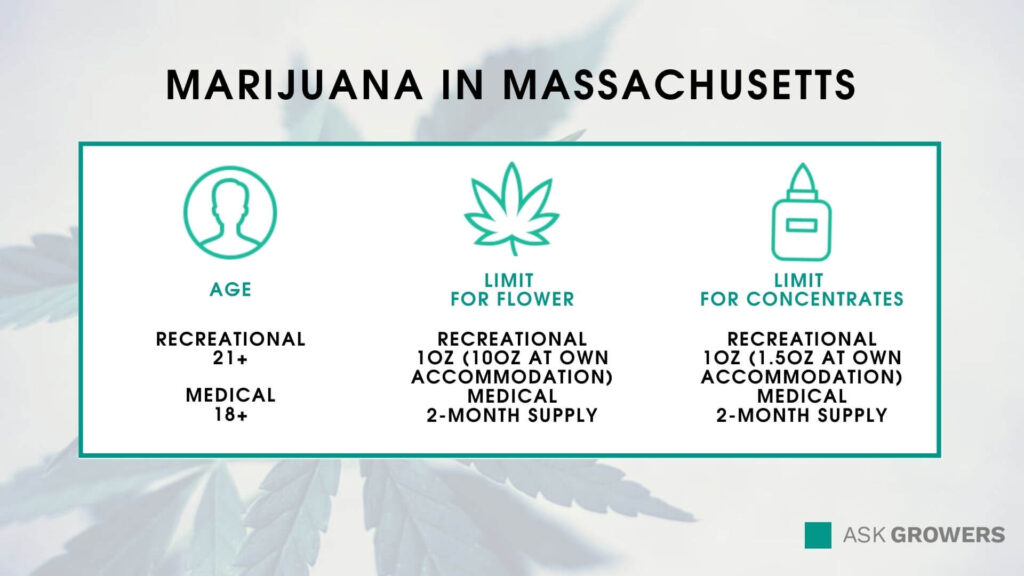
Cannabis Consumption in Massachusetts
Being legal in the state, hemp cannot be consumed in public in any form (neither vapes nor edibles). There are off-limit areas where weed consumption is prohibited. Knowing these locations will help you stay safe while you enjoy cannabis in Massachusetts. The restricted areas are:
- a car;
- a school campus;
- the beach;
- public transportation;
- sidewalks;
- a local park;
- any public place;
- places which ban tobacco smoking;
- federal lands (national forests, monuments, parks).
Marijuana laws allow individuals to use hemp:
- in smoker-friendly hotel rooms;
- on your private property;
- outside your residence out of the public view;
- other options for legal social consumption.
Landlords and employers may have their own requirements and policies on cannabis use, so check with them in advance what is illegal.
Weed consumption on federal lands is a crime even for MMJ patients.
Taxes on Marijuana in Massachusetts
Originally, the tax for recreational marijuana was introduced at 12%. Subsequent discussions led to the increase of the tax to 20%. In addition, hemp sales are subject to a 6.25% state sales tax and an excise tax which has increased from 3.75% to 10.75%. Cities are also permitted to tax recreational cannabis up to an additional 3%, so the total tax that consumers pay depends on the city you are in.
The situation is different with medical hemp. Qualified patients pay no taxes while purchasing cannabis products. Despite legal pot status, it’s wiser to get an MMJ card if you have a qualifying disease.
Massachusetts Medical Marijuana Card
Patients 18 and older with qualifying conditions can register with an MMJ program and receive a card to purchase cannabis for their medical needs. These individuals are exempt from enormous taxes imposed on recreational weed sales.
The application fee is $50 or $10 for a renewal. If you submit proof that your income falls below 300% of the federal poverty level, you can request a waiver.
Another bonus of having a medical marijuana card is that you don’t need to worry that the dispensary will run out of products. According to the state hemp laws, dispensaries are imposed to reserve 35% of medical pot for qualified patients.
While buying cannabis at a dispensary, you’ll be asked to present your state-issued photo ID and an MMJ card.
Massachusetts doesn’t support reciprocity. Out-of-state medical cards are not honored here.
How to Get a Medical Marijuana Card in Massachusetts
The process of obtaining an MMJ card involves several steps. Learn about the registry process for patients and primary caregivers in detail.
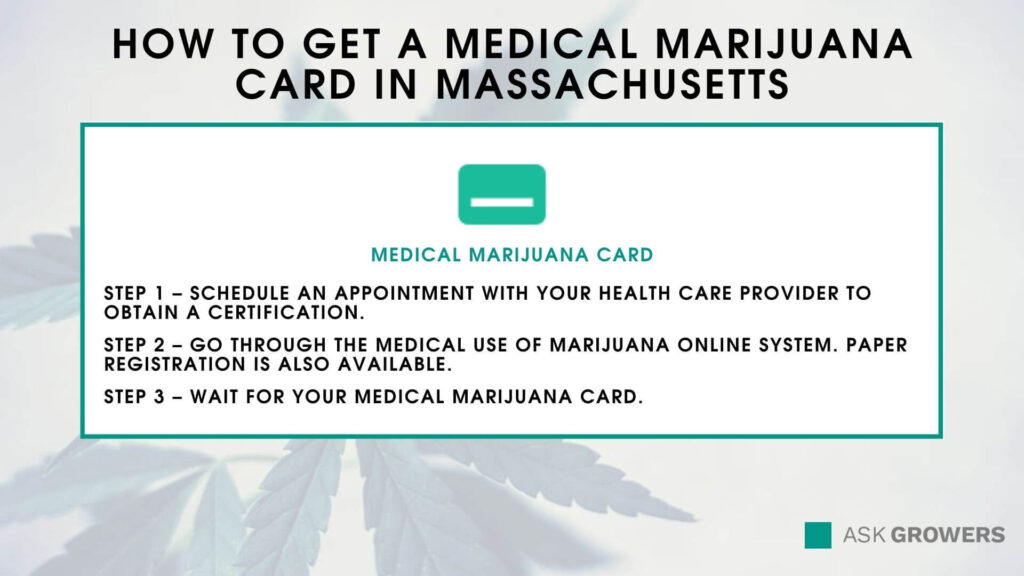
Diseases
To get a medical marijuana card, patients have to obtain certification from a health care professional. This document is issued if your physician believes that you will get benefits from hemp therapy. The debilitating conditions include the following diseases:
- hepatitis C;
- cancer;
- AIDS/HIV;
- glaucoma;
- multiple sclerosis;
- amyotrophic lateral sclerosis;
- Parkinson’s disease;
- Crohn’s disease.
Patients can also be qualified with other debilitating conditions determined by the doctor.
Patient Qualifications
Individuals of 18 years can become qualified patients if they are residents of Massachusetts and diagnosed with any condition from the above-mentioned list.
The certification cannot be obtained from any regular doctor. The physician should act in the regular course of his/her practice and have a complete clinical visit with a patient. The doctor should assess and document the patients’ medical history and their current condition and explain all possible risks of cannabis therapy. Also, physicians should play a role in the ongoing care and treatment of their patients.
Patient Registry Process
The process of registration in the MMJ program is simple:
- make an appointment with a physician and get a certification;
- after you are certified, you’ll get an email from the Massachusetts Cannabis Control Commission with further instructions about how to register in the program;
- the fastest way is to register online. Patients who are unable to register online can opt for paper registration;
- submit your current photo and your ID (current MMJ card or driver’s license). If you submit your military ID or U.S. passport, you’ll be asked to prove your Massachusetts residency. Utility bills, U.S. marriage certificate, lease contract, tuition bills, and car insurance policy are accepted since they include your name and address.
The registration in the program is valid within 1 year and should be renewed annually. Apply for the renewal 2 months prior to the expiration date. The MMJ card expiration date is different from the registration expiration. The cards are valid for 3 years.
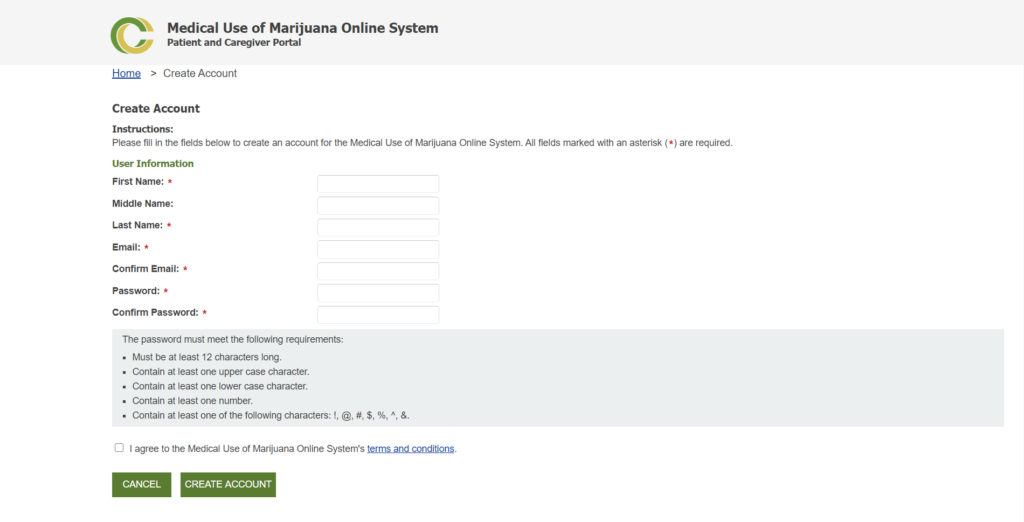
After your application is approved, you can designate 1 or 2 caregivers to help you in medical hemp use and growing weed.
Caregiver Qualifications
Caregivers designated by medical cannabis patients should be 21 years old and provide care for only 1 patient. A visiting nurse, a hospice employee, and a personal care attendant can serve as primary caregivers for adult patients or as second caregivers for patients under 18.
They should also register with the program and renew registration every year (with an MMJ card valid for 3 years). The online registry process is similar to patient’s and requires them to submit a recent photo and their ID card to prove Massachusetts residency.
Transporting Marijuana in Massachusetts
Marijuana transportation is legal for recreational users, MMJ patients, and their caregivers if they transport the pot legal possession limit (1 oz.). Cannabis should be kept in a sealed box out of the driver’s reach. It can be kept in the trunk of a vehicle or a glove compartment.
Similar to other states, driving under the influence of hemp is a crime in Massachusetts. It is subject to penalties that range from a fine to imprisonment regardless of how much THC is in your blood. Neither passengers nor drivers can smoke hemp in a car. Use a ride-share app, public transportation, or ask a sober friend to give you a ride instead of driving while intoxicated.
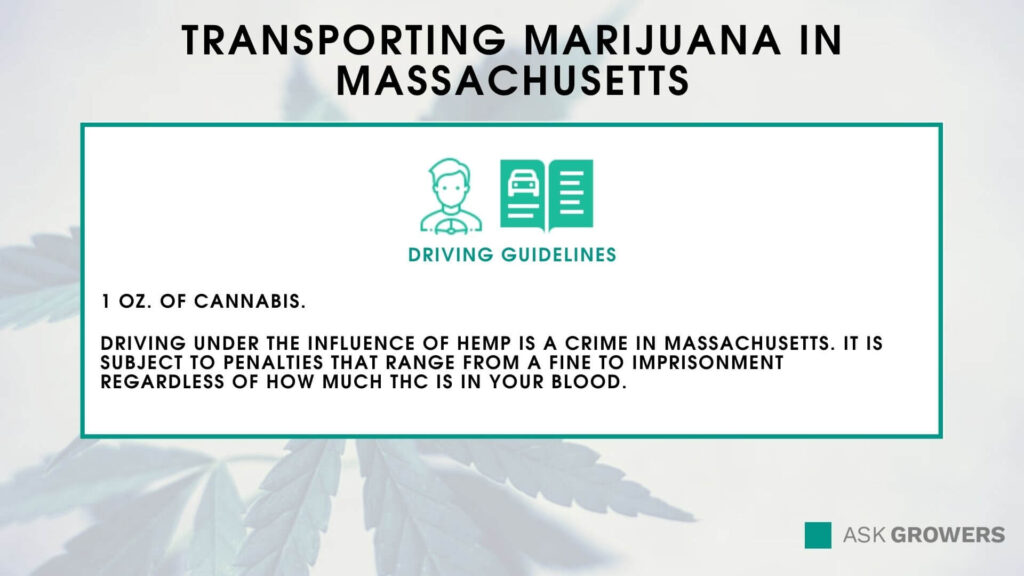
Exporting Marijuana
Despite the fact that hemp has been decriminalized around half the country, it still remains illegal under federal law since it is listed as a Schedule Ι controlled substance. Traveling across state lines with hemp is against the law even for approved MMJ patients. If you are heading to a state where hemp is legal, you cannot export it from Massachusetts; otherwise, you’ll be charged with a felony. If you have extra marijuana, dispose of it to not run into legal trouble.
Shipping your purchased weed home is also banned and counts as moving prohibited substances across state lines. If your mail is caught, you’ll face steep penalties. The possession of cannabis in Massachusetts airports is also outlawed.
Growing Marijuana
Growing marijuana at home is allowed for legal adults, medical hemp patients, and their caregivers. The cultivation limit is 6 plants per 1 person or 12 per household if there are several grown-ups in the family.
Qualified patients should obtain a written recommendation from their health care provider to grow hemp. The cultivation is allowed if there is no pharmacy within a reasonable distance from their homes, or if there is physical inability/financial difficulty to access transportation. They can grow plants to provide a 60-day hemp supply. Cannabis can be cultivated at a patient’s house or a caregiver’s residence but not in both places.
Hemp should be grown in locked places that are not visible to the public. In a rent house, discuss with your landlord all growing restrictions.
Marijuana from home cultivation doesn’t count to a 10-ounce supply that adults are permitted to keep at home.
Licensing for Growers, Manufacturers, Processors, Retailers, Etc.
Under new weed laws, different types of marijuana establishments have been created. Each establishment can choose to participate in a particular part of the cannabis industry and is subject to strict state inspections, rules, and regulations.
The license types are:
- cultivator;
- product manufacturer;
- retailer;
- transporter;
- research facility;
- standards testing laboratory and independent testing laboratory.
One business can hold 3 licenses in each category with some exceptions.
Sources
https://www.mass.gov/info-details/massachusetts-law-about-marijuana
https://www.mass.gov/doc/patient-guidance-for-mmj-registration-2/download
https://wikipedia.org/wiki/Cannabis-in-Massachusetts
https://mass-cannabis-control.com/
https://www.mpp.org/states/massachusetts/
https://norml.org/laws/massachusetts-penalties-2/
https://northofboston.org/about-resources/cannabis-tourism-in-massachusetts/

 Guides
Guides

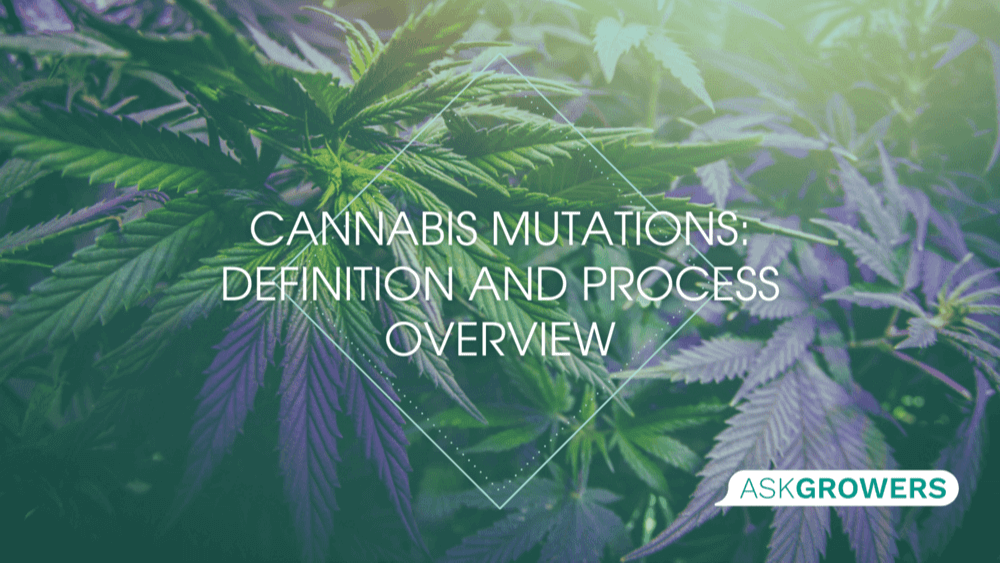
.png)
.png)


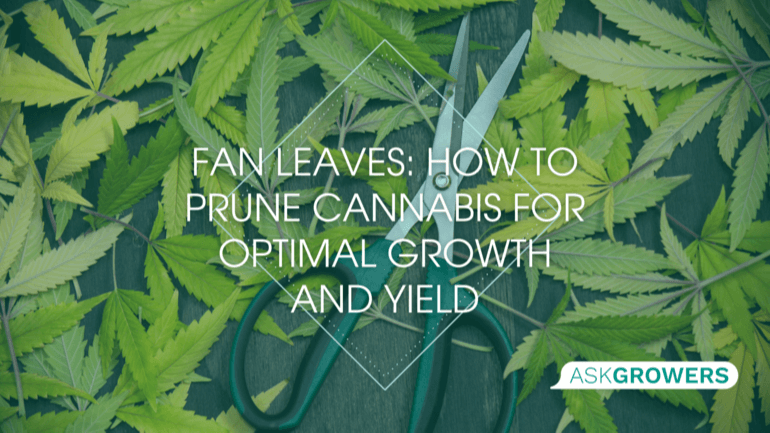
 (1).png)

.jpg)
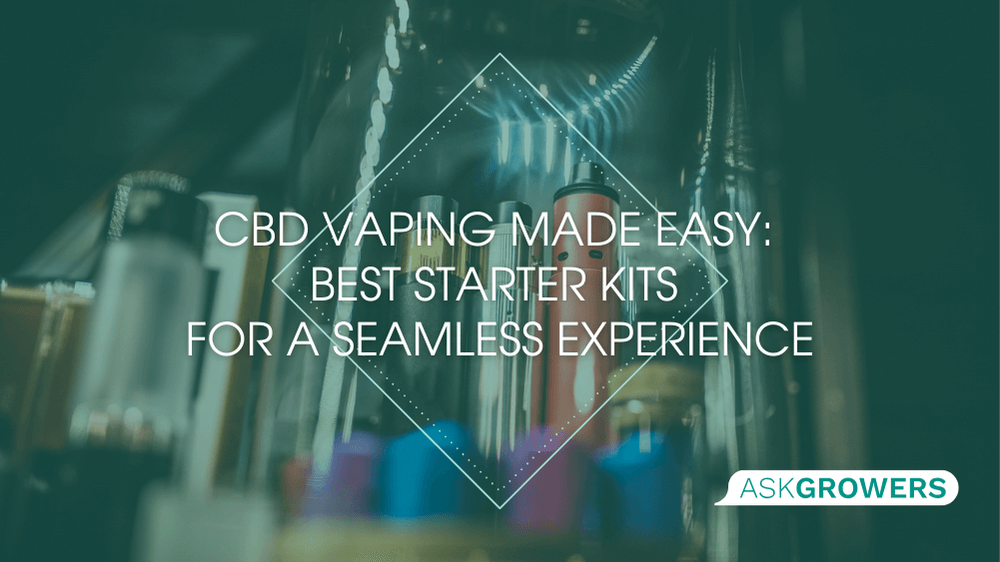
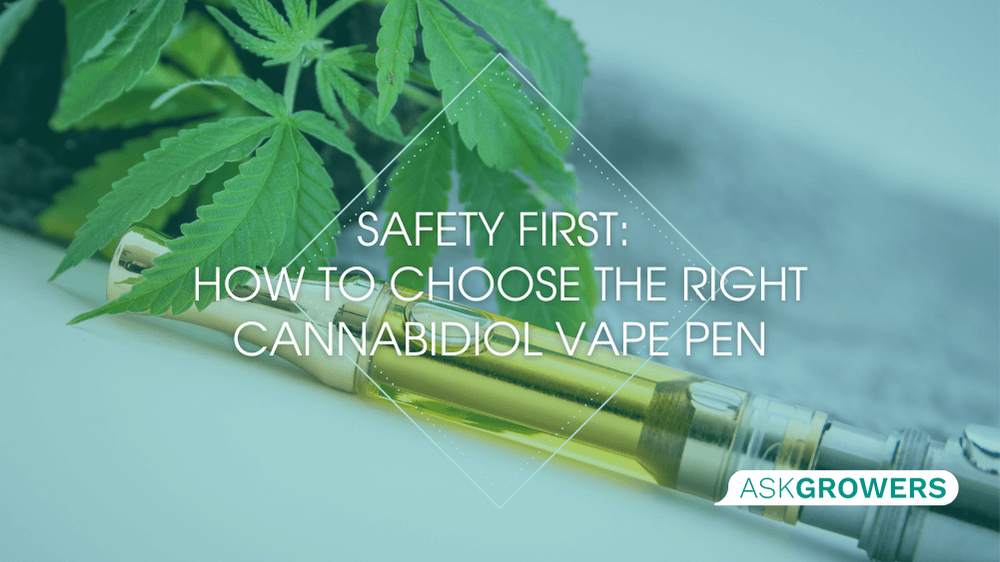
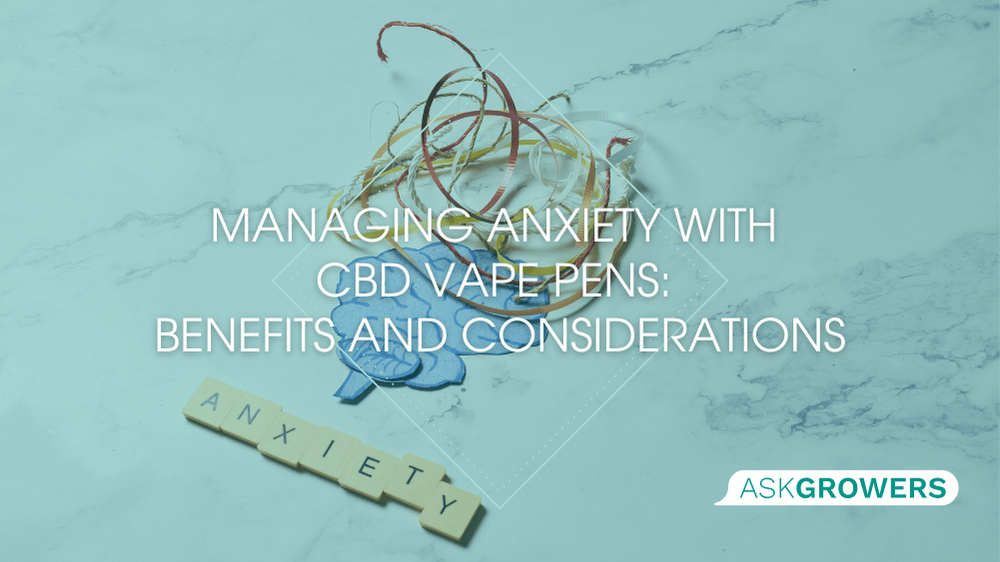
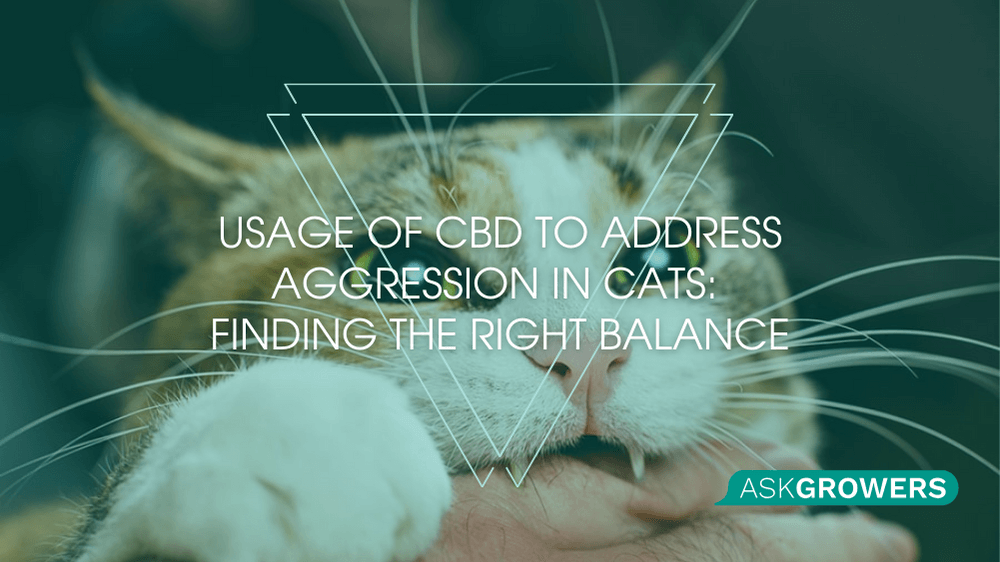
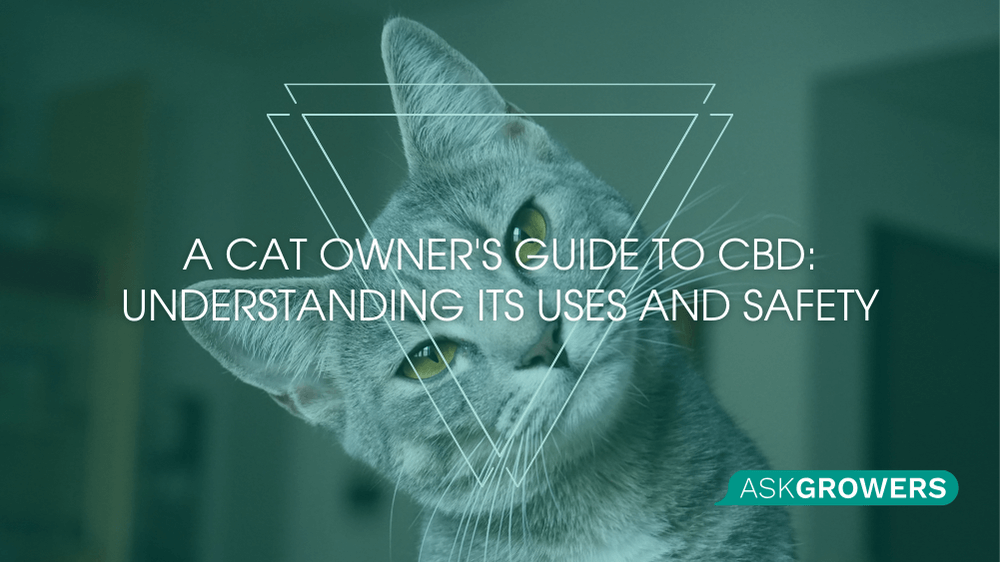
Be the first and share your opinion
Write a Review